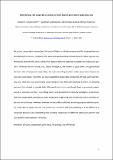Files in this item
Male Norway rats cooperate according to direct but not generalized reciprocity rules
Item metadata
| dc.contributor.author | Schweinfurth, Manon K. | |
| dc.contributor.author | Aeschbacher, Jonathan | |
| dc.contributor.author | Santi, Massimiliano | |
| dc.contributor.author | Taborsky, Michael | |
| dc.date.accessioned | 2020-04-26T23:33:44Z | |
| dc.date.available | 2020-04-26T23:33:44Z | |
| dc.date.issued | 2019-06 | |
| dc.identifier | 258819251 | |
| dc.identifier | 026f5555-91cc-403c-b3e8-c913277dee97 | |
| dc.identifier | 85064766329 | |
| dc.identifier | 000471828200011 | |
| dc.identifier.citation | Schweinfurth , M K , Aeschbacher , J , Santi , M & Taborsky , M 2019 , ' Male Norway rats cooperate according to direct but not generalized reciprocity rules ' , Animal Behaviour , vol. 152 , pp. 93-101 . https://doi.org/10.1016/j.anbehav.2019.03.015 | en |
| dc.identifier.issn | 0003-3472 | |
| dc.identifier.other | ORCID: /0000-0003-2066-7892/work/57088547 | |
| dc.identifier.uri | https://hdl.handle.net/10023/19856 | |
| dc.description | Funding was provided by the Swiss National Science Foundation grants 31003A_156152 and 31003A 176174 to M.T. and P2BEP3 175269 to M.K.S. | en |
| dc.description.abstract | Reciprocal cooperation may evolve if the costs of help are reliably compensated for by delayed returns provided in future interactions. The associated probabilities and cost–benefit ratios may vary systematically between the sexes, which often display different dispersal strategies and interaction patterns. Whereas female Norway rats, Rattus norvegicus, are known to apply direct and generalized decision rules of reciprocal cooperation, the rules according to which males reciprocate favours are less well understood. Therefore, we investigated the cooperation propensity of male wild-type Norway rats. Male test rats experienced cooperating partners that provided food to them, or defecting partners that refused to provide help. Afterwards, test rats could donate food to previously experienced or unknown partners, resembling direct and generalized reciprocity paradigms, respectively. Male rats cooperated according to direct reciprocity, suggesting that this decision rule is similarly important for both sexes. However, whereas females additionally help according to generalized reciprocity, males did not apply this rule. These results suggest a sex difference in reciprocal decision rules, highlighting the potential importance of different interaction patterns and cost–benefit ratios between the sexes. | |
| dc.format.extent | 1008674 | |
| dc.language.iso | eng | |
| dc.relation.ispartof | Animal Behaviour | en |
| dc.subject | Altruism | en |
| dc.subject | Cooperation | en |
| dc.subject | Generosity | en |
| dc.subject | Reciprocity | en |
| dc.subject | Sex differences | en |
| dc.subject | BF Psychology | en |
| dc.subject | NDAS | en |
| dc.subject.lcc | BF | en |
| dc.title | Male Norway rats cooperate according to direct but not generalized reciprocity rules | en |
| dc.type | Journal article | en |
| dc.contributor.institution | University of St Andrews. School of Psychology and Neuroscience | en |
| dc.identifier.doi | https://doi.org/10.1016/j.anbehav.2019.03.015 | |
| dc.description.status | Peer reviewed | en |
| dc.date.embargoedUntil | 2020-04-27 |
This item appears in the following Collection(s)
Items in the St Andrews Research Repository are protected by copyright, with all rights reserved, unless otherwise indicated.

